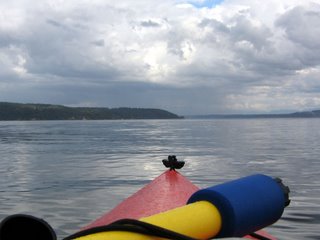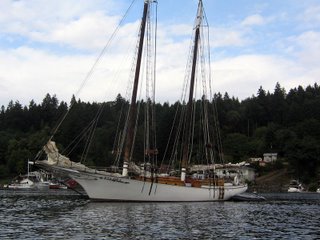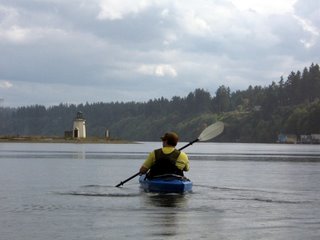Friday, November 03, 2006
Finding oneself in a kayak

September 17:
We stumbled in to Port Orchard, Washington as we had (and would) at numerous other destinations: to sleep on a friend’s floor and swoon along the thin line separating genuine regional interest and cheap-laugh tourism.
It was a Sunday night, and we ate at a local brewery with my friends A. and W., with whom we would stay. Afterwards we followed them through a labyrinth of dark, evergreen-lined roads to their house. At one point we reached the edge of the treeline at the crest of a hill. Beneath us stretched Puget Sound and Seattle’s stately skyline mirrored in the black water. It was a breathtaking reward for a day’s worth of driving through light drizzle among the anonymous comb teeth of giant tree trunks.
The alluring lights of Seattle, almost tangible but distinctly distant, gave me my first pang of longing there, a familiar, mouse-eyed lust for something as unique in my own life.
So many of our friends live graceful lives, graceful in unexpected and perhaps unplannable ways. Often I see poetry in their prospects, in what the future must bring to them, how they must adapt or own up to mundane realities I’m sure they can’t completely escape in such exotic locales as Washington or Idaho.
I admire their bravery. One of Val’s friends moved with her boyfriend to Eureka, CA to be close to his son and his son’s mother. They had all been living near Sacramento, had an established social circle and habits, and jobs. Val’s friend moved to Eureka to make a go of it with her boyfriend, now fiancé, sans job, sans friends, and she’s well on her way in that quiet, mildly impoverished, sea-worn town.
It’s so easy to feel trivial, to marvel at the successes, the failures and the beauty of people—my friends and hers—and wonder how my story can ever measure up. With my bulging overnight bag, suitcase and suite of portable electronics, again and again I feel like I’m a toy nomad chasing after a wind-up dream in a Matchbox car, passing through the concrete lives of people who hike, who research, who tend gardens, who dress in historical garb for work, who own homes.
Which leads me back to A. and W., who own their home in Port Orchard. Husband and wife homeowners, and several months younger than I. They were among my closest friends in high school. W. helped me move two carloads of poorly packed crap into the dorms the summer of my freshman year in college. He stayed there with me for several days, sleeping in the lounge, confusing my floormates who thought he already had irreconcilable differences with his roomies.
At the time, he was contemplating skipping out on Navy boot camp to be with A., who was about to attend college at Humboldt State. He chose to honor his six-year commitment to the service, opting for a post aboard a nuclear submarine as a reactor technician. He never forgot about A., though, and after a couple years his home port was on Puget Sound and hers was, too.
It was a long, strange trip for those two. A. was a fervent hippie in high school (insomuch as the term applies to a person who didn’t go to Woodstock and who doesn’t continuously brag about how great her generation is). She always deplored war and violence (which meant epic arguments with my martial-minded best friend). But her decision to be with W. was about the man, not the uniform. In time, she became a Navy Wife, friends with the other wives whose husbands were at sea for months at a time, party to their celebrations and their complaints.
But A. is still green to the core. She’s attending Evergreen State College and working as a county building permits overseer, responsible for determining environmental mitigation. Apparently this is the crucial, much-maligned junction between the expansionists and the environmentalists, who accuse her of destroying homeowners’ dreams and of destroying the environment, respectively.
And they have a beautiful life together in a lovely, small home erected by a boat builder, with two cats in the yard and two trucks in the driveway.
W.’s life is in flux right now. Just a week before we visited—the week I had told them we were going to be there—he was discharged from the Navy. This was something he and A. had awaited with great anticipation, a final release from the unfortunate schedule and grim absurdities they had both endured for several years.
As we drove to Bremerton to meet them for dinner, I spotted the fleet of decommissioned Navy vessels moored at the Puget Sound Naval Shipyard. Several retired aircraft carriers, USS Independence, USS Constellation, and USS Ranger, await their fates as museums and artificial reefs, along with one destroyer. When I mentioned the carriers to A., she said we might have toured one of them, had we arrived before W.’s discharge. Inwardly I lamented missing that chance.
This was the first time I had seen A. and W.’s home, and I wanted to catch up with them just as much as I wanted to explore the area. I got the chance to do both when the next day A. suggested going kayaking in the Sound.
I had never been kayaking. My familiarity with oar-powered watercraft comes from one (1) time at Disneyland paddling one of those giant canoes around the lake area haunted by a burning cabin and the Country Bear Jamboree; one (1) time trying to control an inflatable raft in the Santa Cruz surf; and the brief stories my father has told me about his solo canoe trips in the wilderness, mostly involving capsizing and the rat bastard raccoons that stole his dry sausage.
It was raining by the time we got to Gig Harbor, and though we all had packed extra clothes in the car for after the trip, none of us had expected to be out in a downpour. We stood on the party boat headquarters of the small kayak rental business, listening to the patter of droplets on the canvas roof, watching the once glassy surface of the small harbor erupt in a billion fleeting minicraters. The assistant, a young, friendly woman, welcomed us to think it over for a few minutes—just long enough for the weather to slacken and for us to get our resolve back.
The woman helped us each into a narrow, plastic vessel and secured our waterproof aprons around the raised lip of the cockpit. Then we were off. Recalling how I only succeeded in paddling in circles in the Santa Cruz surf, I was worried about looking dumb in front of my old friends. Fortunately, the kayak and its double-sided paddle was much more maneuverable and intuitive.
We paddled away from the dock, away from the lines of moored pleasure cruisers and peeling-paint wooden fishing boats. I told A. that this was my first kayaking trip. She was surprised and told me she grew up in kayaks.
“I know,” I said.
She looked back at me with a puzzled expression, as if to say how could you have never kayaked with me before? How could you have overlooked this for so long?
The same question was on my mind, among others. How could I not have done this sooner? How could this not have been a formative childhood experience for me? Did I somehow miss out on the chance to be rugged and outdoorsy growing up?

We headed further out, past the gorgeous two-mast schooner Kia Ora and toward the mouth of the harbor, where a tiny lighthouse sat on a sand spit. All along the eastern shore were immense, multistory vacation homes. On the flatter western shore, more modest homes came right up against the beach. Even these, I thought, are probably only affordable for millionaires.
This was the only discordant thought in my head, however. Anxieties about making a living, getting a job, being a success were muted by the silence and the immediacy of the water and the gentle ripples of our wakes.
I asked him if he thought the Navy is getting soft without major foes like the Soviet Union.
“The feeling of camaraderie, mostly,” he said. “When you’re on duty with one other guy for eight hours nonstop, you’re pretty much forced to talk to each other until you run out of things to talk about.”
I’m proud W. handled his service as well as he did. I don’t know what I would have done in his place, at sea and underwater for weeks at a time, only seeing sunlight on rare occasions when the crew got “steel beach” time atop the hull while the boat was surfaced [more on that and other submariner issues here].
As we paddled back in, I thought about how exciting it must be for W. to be on the cusp of a new and different life, to have a huge array of possibilities open up. I wondered if he had any of the fears I had about the unknown months to come, the shapeless time between jobs when you luxuriate in laziness and then lurk sullenly in the physical and mental chasm of home on a weekday.
But whatever happens, I believe W. won’t be awash in uncertainty.
“I feel like the Navy was one of those opportunities for me to really find myself,” he told me before collecting seashell fragments from the shallows near the lighthouse. “I’m glad I got it. That [experience is] college for most people. And if I go to college, I’ll get to have two of those times in my life.”
W. makes me wonder if I’ve ever really been tested or proven anything. I went to college, panicked as I wallowed around dazed in the immensity of literature, philosophy and history, and popped out the other side feeling almost like I had ducked whatever epiphanies there were to find. If this journey is anything, it’s a test. After going back to my hometown after college and attempting not to call it a retreat, I’m facing uncertainty. After two years of living at home, I’ve been carrying my world in a hatchback Honda for more than 3,000 miles. Now a foreign urban environment awaits. I hope what I find will give my life the kind of natural knowledge, the kind of grace I see in friends like A. and W.

I may be crazy today, but I'm close to tears. Thanks for tellin' story Jeremy.
<< Home

